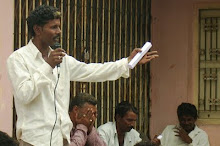Indian Express: Ahmedabad: Wednesday, 30 September 2020.
During the audit, it was also noticed that “there were no efforts on improvement of the economic condition of salt workers and they continue to live in a hand-to-mouth position.”
Salt workers in Gujarat have been largely bereft of benefits from welfare schemes owing to serious lacuna in imposition of basic clauses to deter exploitation in leaseholder agreements as well as due to lack of inter-departmental coordination and an absence of long-term policy in place, the Comptroller and Auditor General’s (CAG) report has revealed.
Simple proposals by the Bhavnagar District Salt Manufacturers Association of providing workers with rechargeable torches in Bhavnagar in 2015 were not fulfilled, neither were proposals to build 69 bathroom and toilets. Proposals for electricity, mid-day meals and tents for salt workers and education or distribution of dress for children of salt pan workers in Morbi, are on the backburner. In fact, the audit observed, “The functioning of DLEC (District-Level Empowered Committee) was not result-oriented,” with 36 of the total 73 work proposals made during 2014-19 in 36 DLEC meetings in seven districts (Patan, Bhavnagar, Kutch, Amreli, Bharuch, Morbi, Surendranagar), seeing no final outcome.
The audit noted that there was “no coverage of salt workers under the Swachchh Bharat Mission” and during joint site visits in May and July 2019 of the lease site of 17 salt units in Bhavnagar and nine units in Kutch, it was observed that none of the salt units provided toilet facilities to the workers. “Thus, the salt workers and particularly women faced difficulties and were deprived of their privacy and hygiene,” the report, submitted on the last day of the Assembly session, observed.
Patan DLEC, which proposed the least number of works (3), told the audit of a peculiar issue when questioned on their poor performance.
According to the authorities, the auditors were informed that the areas where the salt workers are working in Patan district, fall under Wild Ass Sanctuary and the Forest Department does not allow any work in their area as a result of which the line departments are not proposing any work for the salt workers.”
In Bharuch, no DLEC meetings were held for two consecutive years (2017-18, 2018-19) and in Amreli none were held for three consecutive years (2016-17, 2017-18, 2018-19). Maximum works were proposed by Surendranagar DLEC (25) with meetings held every year between 2014 and 19.
District offices forward proposals for welfare works to DLECs which then recommends the same to state-level empowered committees (SLECs) for approval.
A glaring gap noticed in the audit was no accountability of the salt pan leaseholders, with the lease agreements devoid of basic conditions to ensure the workers’ welfare. The administration of salt leases is carried out by the Industries and Mining Department of the government.
The audit found no condition in salt lease for housing to salt workers, leaving them “either at the mercy of salt unit owners for their basic housing requirement or have to manage themselves.” The audit noticed that no housing scheme was launched for salt workers and in its visit in May and July 2019 to houses of salt workers at salt leases in Bhavnagar, Kachchh and Bharuch districts, poor condition of houses of salt workers was observed.
The condition of providing toilets and bathrooms for hygiene and sanitation were not prescribed in the standard salt lease agreements prepared by the Industries Commissionerate or the Industries and Mining Department of Gujarat government in October 2010 and neither were there any standard terms for medical facilities to salt workers by the leaseholders.
“Thus, it was not mandatory for lease holders for construction of toilets and bathrooms…the lease holder was not made responsible to provide medical aid or first aid treatment at the work site to any salt worker… Further, there is no provision for providing group medical insurance for them. In addition, the lease conditions do not provide for ensuring the salt workers and their families inoculated against cholera, plague or other epidemic diseases and vaccinated against smallpox at the time of employment,” the audit observed.
There was neither any guarantee of payment of minimum wages, thus stripping the workers off of any protection against economic exploitation. “The welfare of the salt workers who are hired by big salt units (above 10 acres), their protection against economic exploitation can be ensured through provision of condition for minimum wages, provident fund and insurance by the unit owners in their lease agreement and monitoring of compliance to the lease terms. Audit observed that the standard lease condition does not include any such provision,” the report notes.
Basic amenities such as drinking water, housing, sanitation, roads remain unfulfilled for the major part of the seven districts that the auditors looked at. Funds sanctioned and allocated for the salt workers’ welfare aggregating to Rs 34.69 crore (27 per cent of the total grant provided by the government) remained unutilized during 2014-19 and no expenditure was incurred on housing facilities.
During the audit, it was also noticed that “there were no efforts on improvement of the economic condition of salt workers and they continue to live in a hand-to-mouth position.”
Chief Minister Vijay Rupani, who, in August 2019, had launched an initiative titled Mukhyamantri Sathe, Mokla Mane (With the Chief Minister, with an open mind) meeting different sections of society to discuss issues concerning them, had met with salt pan workers last year. An issue was raised by a Surendranagar worker at the time where a hostel was refusing to enrol salt workers’ children beyond Class VIII, which was then resolved.
During the audit, it was also noticed that “there were no efforts on improvement of the economic condition of salt workers and they continue to live in a hand-to-mouth position.”
Salt workers in Gujarat have been largely bereft of benefits from welfare schemes owing to serious lacuna in imposition of basic clauses to deter exploitation in leaseholder agreements as well as due to lack of inter-departmental coordination and an absence of long-term policy in place, the Comptroller and Auditor General’s (CAG) report has revealed.
Simple proposals by the Bhavnagar District Salt Manufacturers Association of providing workers with rechargeable torches in Bhavnagar in 2015 were not fulfilled, neither were proposals to build 69 bathroom and toilets. Proposals for electricity, mid-day meals and tents for salt workers and education or distribution of dress for children of salt pan workers in Morbi, are on the backburner. In fact, the audit observed, “The functioning of DLEC (District-Level Empowered Committee) was not result-oriented,” with 36 of the total 73 work proposals made during 2014-19 in 36 DLEC meetings in seven districts (Patan, Bhavnagar, Kutch, Amreli, Bharuch, Morbi, Surendranagar), seeing no final outcome.
The audit noted that there was “no coverage of salt workers under the Swachchh Bharat Mission” and during joint site visits in May and July 2019 of the lease site of 17 salt units in Bhavnagar and nine units in Kutch, it was observed that none of the salt units provided toilet facilities to the workers. “Thus, the salt workers and particularly women faced difficulties and were deprived of their privacy and hygiene,” the report, submitted on the last day of the Assembly session, observed.
Patan DLEC, which proposed the least number of works (3), told the audit of a peculiar issue when questioned on their poor performance.
According to the authorities, the auditors were informed that the areas where the salt workers are working in Patan district, fall under Wild Ass Sanctuary and the Forest Department does not allow any work in their area as a result of which the line departments are not proposing any work for the salt workers.”
In Bharuch, no DLEC meetings were held for two consecutive years (2017-18, 2018-19) and in Amreli none were held for three consecutive years (2016-17, 2017-18, 2018-19). Maximum works were proposed by Surendranagar DLEC (25) with meetings held every year between 2014 and 19.
District offices forward proposals for welfare works to DLECs which then recommends the same to state-level empowered committees (SLECs) for approval.
A glaring gap noticed in the audit was no accountability of the salt pan leaseholders, with the lease agreements devoid of basic conditions to ensure the workers’ welfare. The administration of salt leases is carried out by the Industries and Mining Department of the government.
The audit found no condition in salt lease for housing to salt workers, leaving them “either at the mercy of salt unit owners for their basic housing requirement or have to manage themselves.” The audit noticed that no housing scheme was launched for salt workers and in its visit in May and July 2019 to houses of salt workers at salt leases in Bhavnagar, Kachchh and Bharuch districts, poor condition of houses of salt workers was observed.
The condition of providing toilets and bathrooms for hygiene and sanitation were not prescribed in the standard salt lease agreements prepared by the Industries Commissionerate or the Industries and Mining Department of Gujarat government in October 2010 and neither were there any standard terms for medical facilities to salt workers by the leaseholders.
“Thus, it was not mandatory for lease holders for construction of toilets and bathrooms…the lease holder was not made responsible to provide medical aid or first aid treatment at the work site to any salt worker… Further, there is no provision for providing group medical insurance for them. In addition, the lease conditions do not provide for ensuring the salt workers and their families inoculated against cholera, plague or other epidemic diseases and vaccinated against smallpox at the time of employment,” the audit observed.
There was neither any guarantee of payment of minimum wages, thus stripping the workers off of any protection against economic exploitation. “The welfare of the salt workers who are hired by big salt units (above 10 acres), their protection against economic exploitation can be ensured through provision of condition for minimum wages, provident fund and insurance by the unit owners in their lease agreement and monitoring of compliance to the lease terms. Audit observed that the standard lease condition does not include any such provision,” the report notes.
Basic amenities such as drinking water, housing, sanitation, roads remain unfulfilled for the major part of the seven districts that the auditors looked at. Funds sanctioned and allocated for the salt workers’ welfare aggregating to Rs 34.69 crore (27 per cent of the total grant provided by the government) remained unutilized during 2014-19 and no expenditure was incurred on housing facilities.
During the audit, it was also noticed that “there were no efforts on improvement of the economic condition of salt workers and they continue to live in a hand-to-mouth position.”
Chief Minister Vijay Rupani, who, in August 2019, had launched an initiative titled Mukhyamantri Sathe, Mokla Mane (With the Chief Minister, with an open mind) meeting different sections of society to discuss issues concerning them, had met with salt pan workers last year. An issue was raised by a Surendranagar worker at the time where a hostel was refusing to enrol salt workers’ children beyond Class VIII, which was then resolved.
















.jpg)
.jpg)
.jpg)
.jpg)













No comments:
Post a Comment